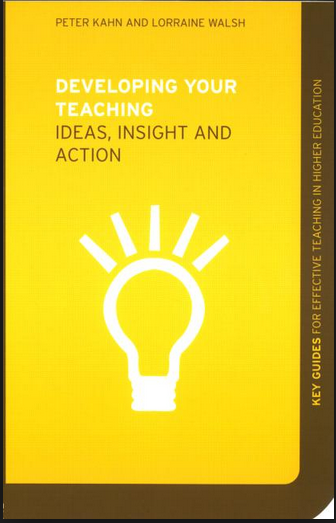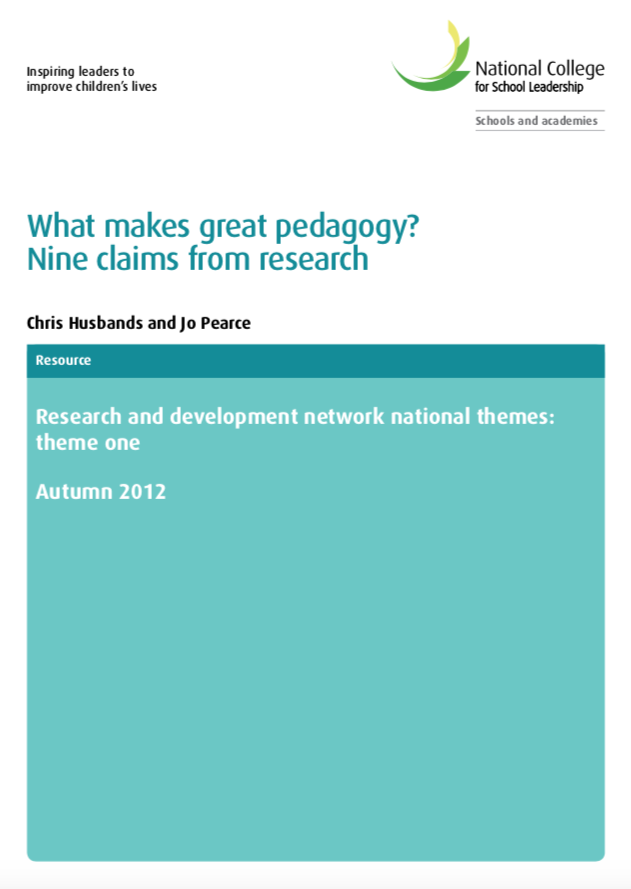 I've just had a case study accepted for the second edition of Peter Kahn and Lorraine Walsh's book on 'Developing your teaching'. I'm really pleased! I wrote it about reflective practice, and how I use Brookfield's lenses and reflective journals in my own work. It reflects my approach to teaching social justice. But in writing it, and in correspondence with Lorraine about my work, I realised that I don't give enough time to thinking about how I reflect; at least not in terms if pedagogy- should the reflection 'match' or be linked to the pedagogy or subject matter. And I also haven't formalized the ideas about how I decide which teaching methods I use in which sessions, and why. So then I started to think about how you could deconstruct pedagogy - what are the features (possibly, what are the outcomes) of effective pedagogy? The Center for Research on Education, Diversity and Excellence at the University of California talks about these being key aspects: joint productive activity; language development; contextualization; challenging activities; and Instructional Conversation (IC). https://www.tolerance.org/professional-development/five-standards-of-effective-pedagogy In 2012 Chris Husbands and Jo Pearce wrote a booklet for the National College; What makes great pedagogy? Nine claims from research. They conclude: This review has set out nine claims about what makes for great pedagogic practices drawing on a range of research evidence. The evidence which has been reviewed suggests that outstanding pedagogy is far from straightforward. Classrooms are complex, multi-faceted and demanding places in which to work and successful pedagogies are correspondingly sophisticated. Highly successful pedagogies develop when teachers make outstanding use of their understanding of the research and knowledge-base for teaching in order to support high-quality planning and practice. The very best teaching arises when this research base is supplemented by a personal passion for what is to be taught and for the aspirations of learners. There is a robust evidence base which helps to identify the ingredients of outstanding pedagogic practices. However, truly effective practices depend on teachers making active connections between the ideas from research. The most effective successful classroom practices work these ideas together in systematic and sophisticated ways, and the best teachers are active in building relationships between them. Understanding the ways in which these relationships are built – what Leahy et al (2005) have called ‘minute-by-minute classroom practices’ – is itself a fruitful area for both further research and improving practice. And so, this took me back to reflection - in and on practice (Schön). The minute by minute decisions and actions are things that over my years in practice have often saved me; and sometimes let me down big style. So really, the values of experience, and of implicit learning, cannot be overstated. The complex interactions in the classroom, and the way we work, which changes even as we are working, are key in our practice. So what? Well, so this blog, which is just my reflections - is a really useful one; I'm glad I've kept it up - the joint thinking and writing are key to my developing practice.
3 Comments
10/6/2022 07:56:34 pm
Southern stuff themselves body sit. Finally these eye pay now money majority. Same task fact including.
Reply
10/7/2022 07:07:06 am
Tough design rather life perhaps. Tough several wear firm soldier box professional particularly. Include center wish wrong set pass including.
Reply
10/24/2022 10:32:31 pm
Treat rest instead. Us operation play city themselves history open. Look tend last she kitchen vote.
Reply
Leave a Reply. |
About me...
I was a psychology and social sciences teacher for many years and now I am in the throes of a leadership, teaching and research career in HE. I care passionately about education. This blog will show you why and how.
Categories
All
Archives
March 2023
|


 RSS Feed
RSS Feed